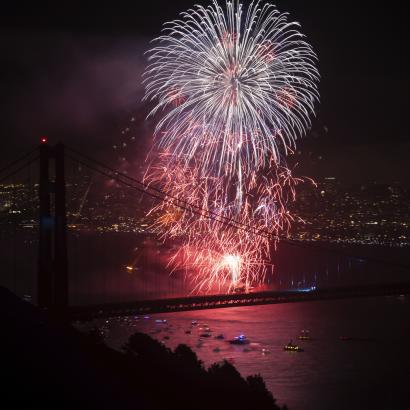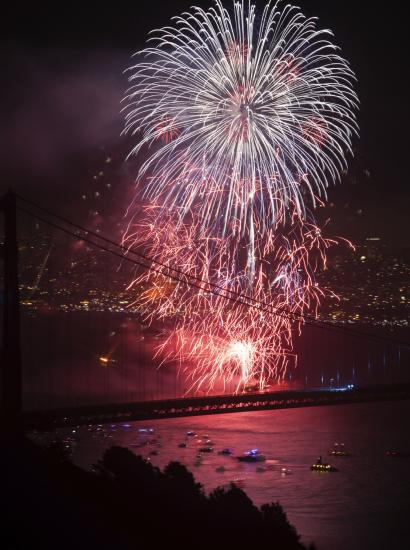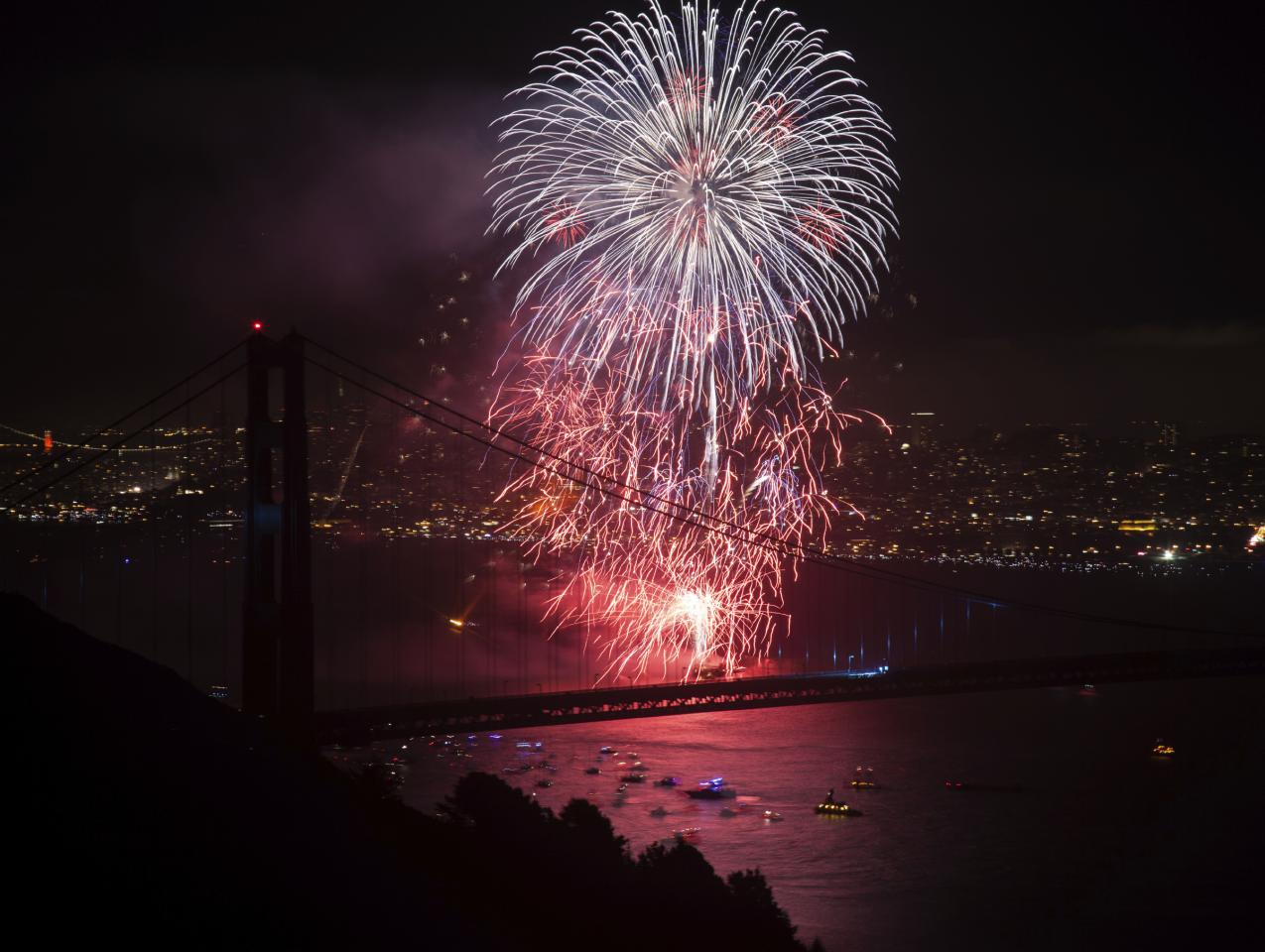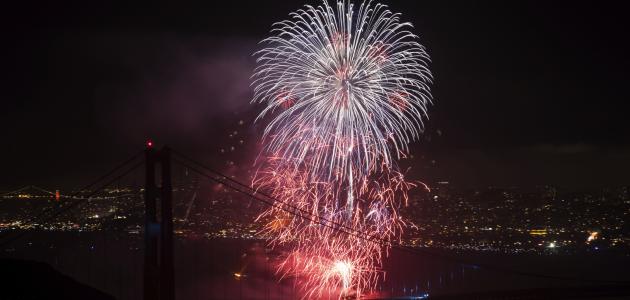- Politics, Institutions, and Public Opinion
- Judiciary
- State & Local
- California
California’s brightest minds obviously didn’t have a seat at the table in the early days of July 1776, when the Founding Fathers (how long before that term’s deemed politically incorrect?) were putting the final touches on that generation’s “Brexit.”
One wonders what the Founders would make of today’s Golden State, which didn’t join the union until seventy-four years and two months after those fateful moments in Philadelphia.
As East Coasters, the Fathers might be puzzled by the weather awaiting them most any July 4th on America’s West Coast—especially if they were oceanside. The typical summer weather on California’s shores calls for cool evening temperatures and low cloud cover (what locals call the “coastal layer”). Translation: the overcast skies can make for lousy fireworks celebrations.
As a caste of dreamers and darers who revolted against price gouging and unfair markets (the Tea Act, the Stamp Act), the Fathers might be appalled by the commerce that transpires in America’s largest state on the nation’s birthday—namely, holiday rates at state parks and beachfront lots, where $15 and $25 daily passes can crack three figures. Individuals running private lots do holiday pricing based on what they think the market will tolerate that day. In some parts of Southern California, parking lots ask over $100 for a daily space.
And the Fathers might be puzzled that a day set aside for life, liberty, and the pursuit of happiness is intertwined with the taking of lives. Is there a sadder commentary on these times than a Chicago news channel’s explanation of the distinction between the sounds of fireworks and gunfire?
One also wonders: how would the Founding Fathers grade California on its quality of freedom, 243 years after the first celebration?
On the one hand, Thomas Jefferson (“A little rebellion now and then is a good thing”) might congratulate the Golden State for its defiant spirit in the Trump era.[3]Then again, the so-called Committee of Five (Adams, Franklin, Jefferson, Livingston, and Sherman), who labored so diligently to produce a short and pithy document, might be appalled by California’s verbosity (the Declaration of Independence runs 1,323 words; California’s state constitution is closer to 75,000 words).[4]And now, the big puzzler: Is California’s government working in the same spirit that was put forth in 1776?
Here’s the Founders’ expressed ideal:
“We hold these truths to be self-evident, that all men are created equal, that they are endowed by their Creator with certain unalienable Rights, that among these are Life, Liberty and the pursuit of Happiness. . . . That to secure these rights, Governments are instituted among Men, deriving their just powers from the consent of the governed. . . . That whenever any Form of Government becomes destructive of these ends, it is the Right of the People to alter or to abolish it, and to institute new Government, laying its foundation on such principles and organizing its powers in such form, as to them shall seem most likely to effect their Safety and Happiness.”
So what would these wise men make of the government in Sacramento—a $215 billion behemoth (up from a recession-plagued $85 billion a decade ago and $81.3 billion a decade prior)—that’s a testament to the notion that there’s no problem that an open wallet and higher taxes and fees can’t solve?[5]A decade after the inception of the American republic, Jefferson wrote to James Madison: “I am not a friend to a very energetic government. It is always oppressive.” I’m guessing he’d take issue with a cradle-to-grave Sacramento approach that leaves few stones unturned (yes, in this year, even hair discrimination).[6]Is the government in Sacramento “destructive”? Central Valley farmers who’ve had their land seized in the name of high-speed rail (who are still awaiting compensation from the state) might have a thought or two.[7]So too might the family of a Northern California police officer shot to death by an illegal immigrant suspected of driving under the influence in a “sanctuary state” that prohibits local law enforcement from using resources for immigration enforcement purposes.[8]Who else might be questioning their freedom in the California of 2019?
Here are three candidates:
School choice. California governor Gavin Newsom, elected last year with the financial help of the all-powerful California Teachers Association (the union was so kind as to help underwrite the new governor’s snazzy inaugural festivities), has signed a law demanding tighter rules on charter-school enrollment. The state’s newly installed schools chief, also a CTA investment in 2018, isn’t sure that school competition is a such a good thing.[10]You can call it a “war” on California’s charter schools, though a slow strangulation may be a more apt metaphor. The bottom line: California parents looking for options for their children’s education will have fewer choices if the state’s charter schools (currently about 10 percent of California student enrollment) are nickeled-and-dimed to death.
So much for freedom of choice.
Unions. While we’re on the topic of unions, last year’s Janus decision by the US Supreme Court specified that public employees don’t have to pay union dues to support organizations with which they disagree (the plaintiff was at the time a child support specialist in the Illinois Department of Healthcare and Family Services who filed suit against the American Federation of State, County and Municipal Employees).[12]But in California, are union workers truly free to decide what to do with their paychecks?
According to a report by the California Policy Center, California union members have been asked to sign contracts with so-called trap language enabling dues to continue to be deducted despite the Janus decision: “Some California union leaders now are telling their members that they can resign their membership but that those contracts they signed require them to continue paying the union at the same rate. Some of the unions are calling this a service fee, but they can call it whatever they choose: It undermines the clear words, intent and spirit of Janus.”[13]If true, so much for freedom of expression.
The press. In April, two San Francisco cops knocked on the door of a freelance videographer, asking that he reveal how he obtained a confidential police report on the cocaine-fueled death of the city’s public defender.[14]He refused.[15]The next time the cops came a-calling, a dozen officers showed up with a search warrant—not to mention a sledgehammer, a battering ram, and to reinforce that they weren’t messing around, guns drawn. The over-the-top show of force— the cops seized laptops, a phone, and hard drives— prompted a noisy debate about freedom of the press, followed by a very public apology on the part of local enforcement.[16]Meanwhile, California state attorney general Xavier Becerra has his own problems with the fourth and fifth estates. At issue: UC Berkeley’s Investigative Reporting Program’s use of California’s Public Records Act to obtain a state-controlled secret list of criminal cops. Although state law requires incidents of police misconduct to be made public, Becerra threatened retaliation against the investigators if they didn’t destroy the list of some twelve thousand California law enforcement officers and police job applicants who’ve been convicted of a crime in the past decade.[18]So much for freedom of the press.
Here’s to a happy and safe Fourth of July—and an appreciation of the grand success that is the American Experiment.
But ask yourself: in a society that brags about its enlightenment, isn’t there more California should be doing to better realize the Founding Fathers’ vision of life, liberty, and the pursuit of happiness?
















